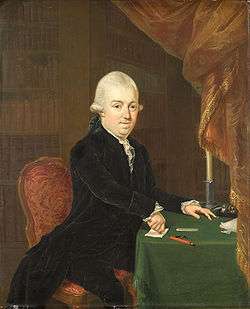Jan Bernd Bicker

Jan Bernd Bicker (27 August 1746, Amsterdam – 16 December 1812, Wassenaar) was a Dutch merchant, politician and a very powerful member of the Bicker family. After studying law and philosophy at the University of Amsterdam, he settled in Amsterdam and became a successful merchant. He served as an alderman of Amsterdam and as an administrator of the Amsterdam branch of the Dutch West India Company (W.I.C.).
Bicker was opposed to the House of Orange and supported the Patriots, a liberal group that wanted to curtail the power of the Stadtholder. A political conservative, he disliked the democrats within the Patriotic movement. Because of his opposition to the Stadtholder, he was forced to leave the country when the latter, with the help of the Prussian Army, removed the Patriots from power. Bicker settled in Brussels and later in France. In France he contacted other leading members of the Patriotic movement who left the Dutch Republic in 1787. Together they formed a Revolutionary Committee.
Bicker and the other Patriots returned to the Dutch Republic after the French had occupied the country in 1795. The Dutch Republic was renamed Bataafse Republiek (Batavian Republic). Bicker was elected a member of the National Assembly and belonged to more conservative Moderaten, or moderates. Despite his conservative leanings he opposed slavery and supported some reforms. He was a member of the Batavian Republic's executive organ, the Staatsbewind, from 1803 to 1805. He played no role during the Kingdom of Holland (1806-1811). He retired from the public scene and lived at his estate Oosterbeek at Wassenaar. He kept ornamental birds and grew pineapples.
He died at Wassenaar on 16 December 1812, age 66.
Family
%2C_by_Edme_Quenedey.jpg)
Jan Bernd Bicker was married to Catharina Six (1752-1793). The couple had nine children.[1] Their son, Henric Bicker (1777-1834), who accompanied his parents in exile in 1787, was ennobled by King William I in 1815. Henric became an untitled member of the Dutch nobility.
Decorations
See also
References
Literature
- Bisselink, M.N.: Jan Bernd Bicker: een patriot in ballingschap 1787-1795, VU Boekhandel/Press 1983, ISBN 9062562639